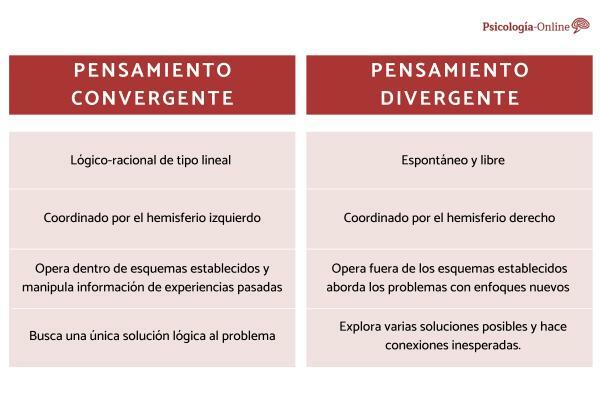
There are many types of problems in our mental health, from affective disorders such as depression to neurodegenerative diseases such as Parkinson's. One of the most common and at the same time most serious psychological problems is personality disorders. We define these disorders as a pattern of persistent behaviors, emotions and thoughts in a person that make their daily life difficult in many ways. There are many types of personality disorders according to their characteristics and consequences psychological.
Do you want to know all the types of personality disorders that exist? Then take note of this article from Psychology-Online. In it you will find a complete list and all the characteristics of personality disorders according to the DSM-V manual.
Index
- Personality disorders according to DSM-V
- Group A personality disorders: eccentric or
- Type B disorders: dramatic or emotional personality
- Type C or anxious personality disorders
- Unspecified personality disorder
- Causes and treatment of personality disorders
Personality disorders according to DSM-V.
As its name suggests, a personality disorder directly affects how we are, that is why its nature is persistent and influences many spheres of our life.
The diagnostic manual par excellence in the practice of psychology is the DSM-V[1]. In it we can find an entire chapter dedicated to analyzing personality disorders. The American Psychological Association (APA) defines this problem as follows:
A personality disorder is characterized by a permanent internal and personal pattern of behaviors, emotions and thoughts that is too far removed from what is expected in the culture. It usually appears in adolescence or adulthood and without psychological treatment it does not vary in the time, causing emotional discomfort in the person and social prejudice towards her for her behavior "abnormal"
The main personality disorders are:
1. Group A:
- Paranoid personality disorder
- Schizoid personality Disorder
- Schizotypal personality disorder
2. B Group:
- Antisocial personality disorder
- Borderline personality disorder
- Histrionic personality disorder
- Narcissistic personality disorder
3. Group C:
- Avoidant Personality Disorder
- Dependent personality disorder
- Obsessive-compulsive personality disorder
Other personality disorders
- Unspecified personality disorder
Next, we are going to briefly describe this classification and what characteristics each disorder has.

Group A personality disorders: eccentrics or.
Known like this for their "strange" behavior and outside the social norm. They are reserved personalities, with the absence of close personal relationships and a fairly low emotional expression. They are usually labeled with the adjective "strange" or "eccentric" and we divide them as follows:
Paranoid personality disorder
They are people who are continually suspicious of others, believe that the whole world is against them and usually isolate themselves to avoid being harmed. They do not trust and are often very spiteful. All this leads them to present difficulties in relating to other people and a practically constant state of anxiety. If you want to know more, you can consult this other article about the paranoid personality disorder.
Schizotypal personality disorder
Schizotypal Personality Disorder is perhaps the most eccentric of the three, a person with equizoid tends to have behaviors that are completely out of the ordinary, lives in its inner world and creates a system of ideas own self. However, it is not too difficult for them to relate to others.
Schizoid personality Disorder
People with this disorder interpret their life events in a distorted way, so they tend to isolate themselves completely from society. These people do not usually think that their problem is disabling, however, it is necessary to recommend psychological treatment.

Type B disorders: dramatic or emotional personality.
Cluster B disorders are usually people who present very extreme and uncontrolled emotions, they are unable to manage their feelings and this usually causes them enormous discomfort and difficulty in taking decisions. Another common feature of group B personality disorders is that they have many difficulties in relating to others.
There are four ways in which type B personality disorder can be expressed:
Antisocial personality disorder
This disorder has been added more recently to cluster B since the symptoms are precisely the lack of expression of emotions towards others. The antisocial personality disorder it is closely related to the personality of a psychopath and sociopath.
Borderline personality disorder
Also known as BPD or Borderline disorder. The symptoms of borderline personality disorder are:
- Lack of emotional control
- Impulsiveness
- Unstable personal relationships
- Fear of abandonment
- Constant negative thoughts ...
If you feel identified with these symptoms, you can perform the borderline personality disorder test. People with BPD have a great mental suffering that they can sometimes try to mitigate with self-harm, alcohol and drug abuse. There are studies that affirm that a large percentage of people who have suicidal attempts suffer from this type of personality disorder[2].
Histrionic personality disorder
This disorder it is characterized by exaggerated behavior and uncontrolled expression of emotions. They are usually individuals with a very marked and egocentric personality (they want to be the center of attention), for that same reason, they often use the seduction and / or victimhood to focus attention on them.
Narcissistic personality disorder
We finally come across this personality disorder. The characteristics of a person with narcissistic disorder are as follows:
- Egocentric dialogue: they always talk about themselves
- Superficial belief of superiority
- Envy towards others
- Internal insecurity that they try to hide with an air of greatness ...

Type C or anxious personality disorders.
Finally, we find this way of grouping these pathologies of the mind. This type of personality disorder is characterized by a pattern of anxious and fearful behaviorsThey often live in fear that something bad will happen and their mind is often occupied by recurring and obsessive thoughts.
Avoidant Personality Disorder
As the name suggests, people with this type of personality disorder often avoid relationships social out of fear and for a feeling of inferiority. They tend to be constantly worried about what other people think of them and that generates a practically constant state of anxiety.
Dependent personality disorder
When a person develops a dependent attachment style, he may end up with this type of personality disorder. Highly dependent people need a few constant care and attention to feel loved and valued. Their communication style is passive since they are afraid of being rejected for their ideas or feelings. In addition, they usually do great efforts and favors to get much needed support and care.
Obsessive-compulsive personality disorder
Better known as OCD, people with obsessive-compulsive disorder They are those that are dominated by their own recurring thoughts and need to perform compulsive actions to mitigate mental obsessions. This disorder is well studied and is divided into two very marked phases:
- Obsessive thinking: "if I don't clean the house, I will get infected and die"
- Compulsive action: "I have to clean every day at all hours and disinfect my house to avoid contracting a disease"
OCD can appear in many ways and its nature is not to be meticulous with cleaning and the skin, it is important comment that obsessive thoughts can be very varied and, as a consequence, compulsive actions can be of many types.

Unspecified personality disorder.
The diagnostic manual reserves this category to include the types of personality disorders that do not fit any of the pictures mentioned but they meet the definition of personality disorder. That is to say: patterns of behavior, thoughts and emotions that last over time and that usually generate a strong discomfort to the individual who presents them.
- An example of an unspecified personality disorder is the presence of some traits and characteristics of a specific personality disorder but which do not meet the full criteria (ie a "mixed personality").
Causes and treatment of personality disorders.
The most effective treatment has proven to be psychotherapy combined with the use of drugs in strictly necessary cases.
Psychopharmaceuticals such as fluoxetine they help to maintain a relatively stable state of mind with which a person can begin to improve their behaviors. However, the linchpin in the treatment of personality disorders is psychotherapy: it is imperative that the individual learn coping strategies in order to improve over time. These types of disorders usually have a chronic prognosis, so that, more than a cure, the objective of treatment is that the patient learns to live a stable life controlling and knowing his atypical traits of personality.
Causes of personality disorders
The exact cause of these disorders is unknown, however, many experts claim that they appear from the interaction of genetic factors, attachment styles insecure, ambivalent or avoidant and by others psychosocial factors.
This article is merely informative, in Psychology-Online we do not have the power to make a diagnosis or recommend a treatment. We invite you to go to a psychologist to treat your particular case.
If you want to read more articles similar to Types of personality disorders, we recommend that you enter our category of Clinical psychology.
References
- Diagnostic and Statistical Manual of Mental Disorders: DSM-5. Editorial medica panamericana, 2014.
- LeGris J, van Reekum R. The neuropsychological correlates of borderline personality disorder and suicidal behavior. Can J Psychiatry. 2006, 51 (3): 131-142.
Bibliography
- Belloch, A., & Álvarez, H. F. (2008). Personality disorders. Synthesis.
- LeGris J, van Reekum R. The neuropsychological correlates of borderline personality disorder and suicidal behavior. Can J Psychiatry. 2006, 51 (3): 131-142.


